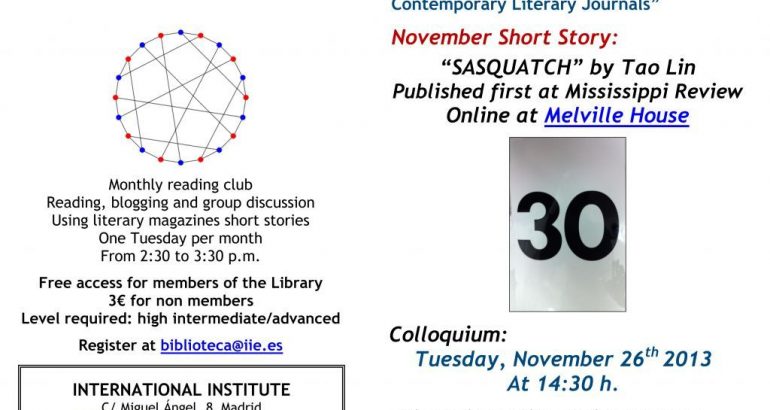
November Reading Circle Story: Tao Lin’s “Sasquatch”
Details November session Reading Circle 2013
There is an idiomatic expression in English that might be of use to us as we think through Tao Lin’s “Sasquatch”: to take (someone or something) with a grain of salt. The expression means to resist believing entirely in the immediate appearance of some outward or superficial truth, and instead to delay judgment until proper reflection can take place. As the parenthetical reference indicates, this can be applied to people as well as to things.
In reality (perhaps a strange term to use in this context), your reading for this month’s session of the Reading Circle consists of two texts: Tao Lin’s story and Tao Lin himself. This, I would argue, is a natural condition of the (very profitable) phenomenon that Tao Lin has engineered, and has had engineered, in the generation his ever-evolving, almost exclusively virtual “brand”: his character (or caricature?), disseminated predominately through surrealistic interviews on obscure but authentically “independent” (this is a term that demands definition here) online literary websites/journals, has become as much of a stylistic creation as his prose and thematic content. In the age of DIY (Do It Yourself) literature, where everyone is virtually everywhere, the avatar you perpetuate through “real” media is your own best publicist/publicity. Ana has generously provided us with several excellent examples of Tao Lin staging just this type of textual performance; I highly encourage you all to peruse them, especially the May 2007 interview with Bookslut.
But as polarizing and perplexing as Tao Lin the writer/personality may be, his work speaks for itself. I would not hesitate to call him, as many have, among the most important and influential authors writing in English today. The question then becomes: How much salt should we take with this story? Its author deserves a heaping spoonful, no doubt; however, “Sasquatch” seems, to me at least, to bypass the theatrical affectations that so many critics and readers point to when they encounter Tao Lin’s work for the first time, and which, in my opinion, seems to dominate, at times, and to their detriment, the reception of some of his other pieces. This is a sad story, movingly rendered in poetic bursts of visceral imagery that, to me at least, strike deep inner chords that sound truer than most words. Which is to say, it is something like high art. Perhaps the vulnerability and loneliness that radiate throughout this story is just Tao Lin, writer/human, with no game to play. Or perhaps I should reach for the salt shaker. I look forward to hearing your thoughts on this.
In the Bookslut interview that I mentioned earlier, the author had this to say about “Sasquatch”:
I’m proud of my story, “Sasquatch,” that is in Bed. I think I showed the crippling loneliness of the main character in a clear, easy to understand, yet not too melodramatic and not too life-affirming but still with the effects of something that is refreshingly life-affirming, but in a way that is long-term rather than short term, in that story.
Perhaps this only muddies the waters for a deeper understanding of the story; perhaps not. That is for you to decide. One thing that must be indicated, and that is made clear by the above quote, is that the role of humor is really pivotal for Tao Lin, in all his writing (and quotable statements). But humor should not be taken as a generic category. In much of his work the despondency of the characters and the prose that evokes them generate ironic humor in contrast to dialogue, or the chaos of random events. I don’t think that’s what’s happening in “Sasquatch,” however. I’m interested to hear your thoughts on the humor operating in this story, because I think it heightens what is, in all honesty, a very tragic situation, and accentuates the emotional charge of Tao Lin’s prose.
For our discussion next Tuesday the 26th, I have the following people listed for our six roles:
Discussion Leader: Nuria
Summarizer: Maria Jesús
Passage Person: Mave
Wordsmith: Patti
Characterizer: Isabel
Culture Collector: Carmen Gonzalez
In order to avoid stepping on Nuria’s toes, I’m going to limit myself to two guiding question clusters to keep in mind going forward:
1. Do we control our hearts? How is the human body anthropomorphized here? What does that suggest about our main character?
2. What do the Loch Ness Monster and Sasquatch have to do with Chelsea?
I’ll leave you with one more quote from Tao Lin’s Bookslut interview. I think it may have some relevance for our reading of the story; tell me if you disagree.
My life is controlled by ethics and morals. Ethics and morals have me on lockdown. I’m being serious right now. Without morals life is meaningless in the long-term. Most people do not have morals. I try to have morals. I think my goal in life is to reduce pain and suffering. I’m being serious right now. Having a goal in life can cure depression and also help other human beings and animals. I don’t eat meat and dairy unless I find salmon sushi or something in a trash can and eating it will reduce pain and suffering in the world somehow. Not eating meat or dairy isn’t just for the animals. Let me explain about veganism.
See you next Tuesday.
Andrew Bennett




